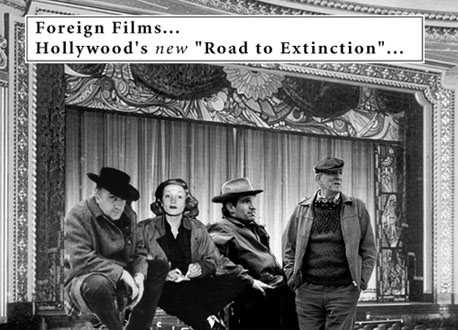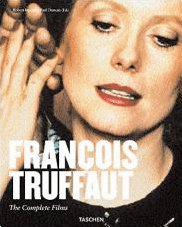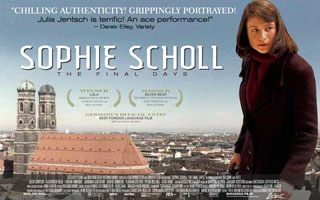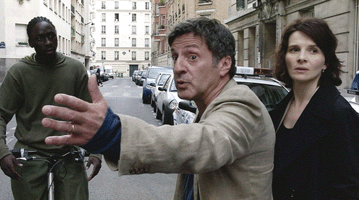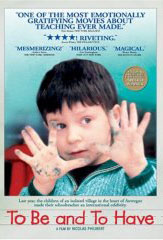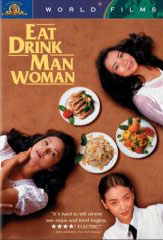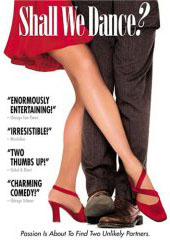WHERE HAVE ALL THE FOREIGN FILMS GONE?
By Mark A. Wilson
Introduction by Mark A. Wilson
Wildcelt's Pic
"Downfall" by Mark A. Wilson
Caché (Hidden) by Wildcelt
Quick Pics by Chris Margolin
Introduction by Mark A. Wilson
When I was growing up in Chicago in the early 1960's, one of my favorite things to do was go with my mother on special occasions to watch a foreign film at the local "art-house", as it was called in those days. The Hyde Park Theater, just a few blocks from our apartment, showed only foreign films, and they ran for weeks at a time, usually to a full house. Such foreign films as "Last Year at Marienbad" (French-Italian, 1961), D.H. Lawrence's "Sons and Lovers" (British, 1960), and Ingmar Bergman's "The Seventh Seal" and "Wild Strawberries" (Swedish, 1957), were very popular in our neighborhood during my childhood, both with adults and adolescents.
Today, the Hyde Park Theater no longer exists. The building was empty, and the entrance was shuttered the last time I visited my old neighborhood during the summer of 2003. In it's place, a multi-plex cinema has opened in the local mall, which shows endless repetitive versions of "car-chase-and-exploding-building" action films to mostly teenage audiences. There is no other theater in this neighborhood, (which includes the University of Chicago campus) that shows foreign films on a regular basis anymore.
The fate of this particular art-house theater is symptomatic of a nationwide trend that has seen a steady shrinking of distribution of foreign films over the past decade. In a recent feature article published in the New York Times, it was pointed out that foreign language films (i.e. those that have subtitles) have seen a marked decrease in both the number of screens they are released on in the United States, as well as their total share of the annual income from box office receipts in this country.
Several reasons for this decrease in viewer ship of foreign language films in the United States over the past decade. The recent New York Times article discussed some of them. Part of the problem is a self-fulfilling prophecy, where-in distributors believe that American audiences aren't as interested in seeing foreign films as they once were, so they release fewer of them, and put those they do release on fewer screens for shorter runs. This creates a vicious cycle effect, in which American audiences have fewer and fewer opportunities to see foreign films each year, so of course the total income from foreign films goes steadily down.
Another reason for the decline in foreign film viewer ship in the United States is that foreign film producers do not have the huge publicity budgets needed to compete with the new Hollywood mega-studios' budgets. Clearly, if American filmgoers don't see much publicity about foreign films, they are not likely to seek out such films in the few places that still show them.
Whatever the cause, we at Wildcelt believe passionately that foreign films are becoming an endangered species that deserves attention from the movie-going public.
To further this cause, this new link will feature reviews of the best new foreign films, both those playing in theaters, and those available on DVD or VHS. This link will be dedicated to the proposition that without the alternative voices and viewpoints which foreign films offer us, the richness and quality of American culture would be seriously diminished.
*** Wildcelt's Pick ***
Don't miss this one
Sophie Scholl "The Final Days" (2005)
Based on a true story, "Sophie Scholl" is a thrilling, suspenseful drama about the arrest, interrogation and eventual prosecution of a soft spoken, intelligent college student, who along with her brother and a small group of colleagues took a stand against Nazism in 1943. Such a movement among intellectuals was called the "White Rose", an underground organization made up primarily of college students who sought to bring down the third Reich. The group secretly met and printed up, then disseminated leaflets which told of the devastating corruption and atrocities perpetuated by the Nazi Party.
At the films beginning, Hans (Fabien Hinrichs) decides to turn up the volume in their movement by distributing propaganda leaflets at a Munich University while class was still in session. Sophie (Julia Jentsch), decides to assist him in this dangerous endeavor. Subsequent to her placement of the leaflets, a janitor becomes suspicious and soon after both Hans and Sophie are arrested. The siblings are immediately whisked off to be interrogated by Nazi Inspector, Robert Mohr. The two are questioned separately, what ensues is unquestionably some of the most riveting interrogation scenes ever filmed.
Director Marc Rothemund films these tightly composed shots to release all the emotions being experienced by Sophie during this grueling exchange. I was amazed to see how with rapid fire delivery Sophie was able to competently answer all of the Inspectors inquiries, without breaking a sweat. She handles herself so well that initially it appears she will be cleared, since brother and sister had previously worked out matching stories in the event of capture. At times the director creates the intimacy of a theatrically staged play rather than cinematic in feeling, which lends to an even more claustrophobic atmosphere to the film. Even though the events covered in "Sophie Scholl" , capture, interrogation, trial, all appear short, a mere six days, we are compellingly drawn into the tragic life of this lovely, idealistic woman. This is largely due to the remarkable acting talents of Jentsch, who is required to emote life-threatening emotions with such mercurial ability. This is a career-making performance. Ultimately, this is a film that ricochets us back in time to an era that hopefully, will not soon be forgotten.
"Downfall" Germany, 2005
by Mark A. Wilson
Very few war films have the power to literally make us feel the sense of chaos and impending doom that grips the defenders of a city under siege. "Downfall", about the battle of Berlin and the final destruction of Adolph Hitler's inner circle in April of 1945, is one of those rare films
that has such power.
Watching this riveting depiction of the last two weeks of Hitler's life, you can smell the blood and sweat of the dying German soldiers as they cry out in agony in a field hospital.And when the Russians begin shelling the center of Berlin, you feel the thundering impact of the artillery shells, as they explode in the middle of a street, sending showers of debris into the air, and obliterating human bodies caught in their vortex of destruction.
But it is the intimate view of the final days of Hitler's inner circle, which are so vivid that make you feel you are right there, experiencing all of the intense emotions as they face the grim truth of their imminent deaths. You can even empathize with the tragic murder/suicide of Joseph Goebbels' wife and family, and dread the moment when Mrs. Goebbels force feeds deadly poisonous pills to her own children. This is the type of authentic historic film that has become all too rare in today's Hollywood. Indeed, it was made appropriately, in Germany.
Downfall stars Bruno Ganz, Alexandra Maria Lara directed by Oliver Hirschbiegel.
Caché (Hidden) 2005
by Wildcelt
The film opens with what feels like, the lengthiest static long shot in film history.At the onset of this unflinching, French thriller, we discover we are watching a surveillance video-tape that was anonymously left outside the door of the homes occupants.
Georges (Daniel Auteuil), the affable T.V. host of a popular show about books, and his lovely wife Anne (Juliette Binoche) who's in the publishing business, are the targets of this "high-tech" harassment. As video tapes of Georges life arrive in his mailbox with alarming frequency, his families ultra comfortable, Parisienne lifestyle abruptly becomes threatened.
German director Michael Haneke gives us just enough historical background regarding the "Algerian Massacres", of the 1960's to show us why Georges must confront his past. Along the journey, Georges tries to unravel mysterious events, and while trying to discover the identities of his stalkers he encounters Maji (Maurice Benichou), a childhood acquaintance, also from his past.
Haneke cleverly eludes to current upheavals in France. He shows strong parallels between Georges not wanting to follow through with the shocking but inevitable meeting with Maji, and the recent political unrest in Paris. There are some incredibly graphic scenes in the film that are by no means gratuitous. I found them vital in moving along his characters development.
In the final analysis it was the uncompromising ambiguity of the film that I found refreshing. Has our society crossed the line with it's obsession in merchandising voyeurism? This film allows us to be in the drivers seat, sit back and watch someone else's life be creepily
exposed. Hitchcock would have loved it!
"QUICK PICKS"
by Chris Margolin
To Be and To Have (2002)
A charming documentary about a country schoolhouse in rural Saint-Etienne Sur Usson, where George Lopez teaches local children aged 3 to 13 in one classroom. He is dedicated, patient, attentive, and encouraging to all the students, and they become well-behaved, respectful learners.
Directed by Nicolas Philbert.
Good Bye, Lenin (2003)
A look at East Germany before and after the fall of the Berlin Wall. A young man, Alex, coming of age, lives with his mother, sister, her boyfriend & their baby. His mother, a good Communist, falls into a coma just prior to the wall coming down. Soon thereafter, Germany becomes "westernized". Upon awakening 8 months later, Alex and his family & friends conspire to keep the country's reform a secret from her, due to her weakened heart. Alex goes to great lengths, often hysterical, in this difficult endeavor.
Directed by Wolfgang Becker.
Eat Drink Man Woman (1994)
An early Ang Lee film, it depicts a widower, Tao Chu, Taiwan's most famous chef, struggling to accept his 3 daughter's sudden interest in boys. It is a light comedy with touching depictions of a man trying to maintain authority over his daughters' lives while they enjoy freedom, yet realize their obligations to their father and the new dynamics of a family without their mother.
The Wedding Banquet (1993)
Another Ang Lee film, and another comedy. Wei Tong, a successful Manhattan businessman is in a perfect relationship with his live-in lover, Simon. However; his parents don't know he is gay and when they decide to visit him from Taiwan, he asks for help from his neighbor, Wei Wei. She agrees to pose as his fianc�e. You can imagine the comedic happenstances that could occur....and do.
Man On The Train (2002)
This is a film about an old gangster who arrives by train in a small French town where he plans to rob the local bank. After learning that there are no rooms at the local Inn where he had hoped to plan his crime, he happens to meet an elderly teacher who offers a room in his own house. The two very different men slowly begin to build a relationship and discover that each might have been better suited for the other's way of life.
Directed by Patrice Leconte.
Starring Jean Rochefort and Johnny Hallyday
House of Flying Daggers (2004)
Everyone's probably heard of this film, and though many scenes are fantastical (the in-air fight scenes, etc;) the cinematography is beautiful, special effects amazing, the sound envelopes you and the story captivates. The color of the bamboo forest is just breath-taking. Sort of like a video game come to life.
Directed by Yimou Zhang.
Monsieur Ibrahim (2003)
Teenage orphan, Momo, lives alone in a working class neighborhood. He befriends the prostitutes on the street, as well as Monsieur Ibrahim (played by Omar Sharif), a Turkish storekeeper. Gradually, Ibrahim becomes a father figure for Momo and he learns much about the meaning of life. Their journey to Ibrahim's home is a wonderful adventure for Momo. ****A must see********
Directed by Francois Dupeyron
Shall We Dance (1995)
Definately better than the remake with Richard Gere! A shy and somber Tokyo office worker, Shohei, notices a beautiful woman in a local dance studio and he bravely signs up for dance lessons with her. He quickly realizes he has talent and loves dancing, so much to the alarm of his wife and daughter. A sweet, funny, touching film.
Directed by Masayuki Suo.
Il Postino (1995)
The local mailman, Mario, lives on an Italian island and yearns for the beautiful waitress in the local restaurant there. He is not handsome, nor young, but falls madly in love with her, even knowing that she has many other admirers. When Pablo Neruda, the famous poet, arrives to live on the island, Mario delivers his mail and picks up lessons on love, life, poetry, & beauty from Neruda. These things can make any man attractive, he finds out. A wonderfully romantic & "feel-good" movie.
Directed by Michael Radford
The Triplets of Belleville (2003)
An animated film from France, directed by Sylvain Chomet. There are no spoken words at all in this unique movie; just sounds & music. A lonely boy lives with his grandmother and seeing that he loves his bicycle, she encourages him to ride, then train for competition. He becomes a life-long trainer in the sport. Years later, while riding in the Tour de France, he is kidnapped, and the story escalates into a wild search for the culprits. The grandmother is helped by three strange old women called," The Triplets of Belleville" in a grand adventurous and cunning chase to rescue the bike rider. Very innovative; great music, and you realize that dialogue is not a necessity to tell a story.


